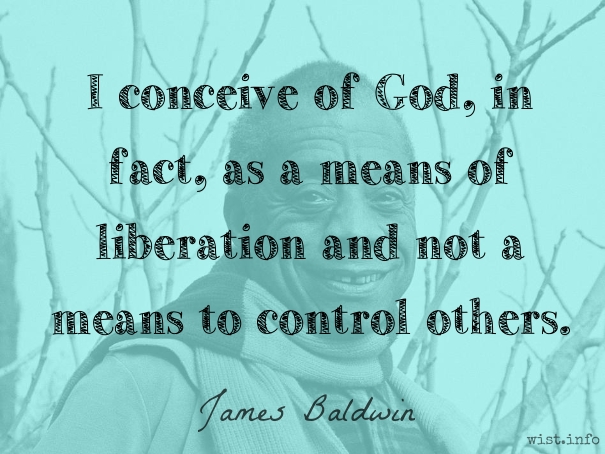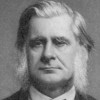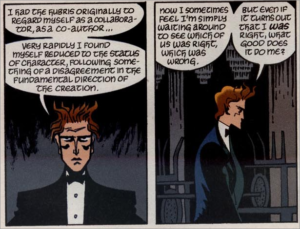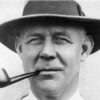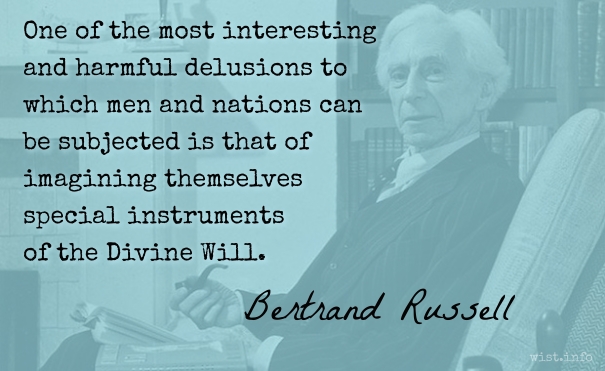The staircase that leads to God. What does it matter if it is make-believe, if we really climb it? What difference does it make who builds it, or if it is made of marble or word, of brick, stone, or mud? The essential thing is that it be solid and that in climbing it we feel the peace that is inaccessible to those who do not climb it.
Quotations about:
God
Note not all quotations have been tagged, so Search may find additional quotes on this topic.
Do not let the wise boast in their wisdom; do not let the mighty boast in their might; do not let the wealthy boast in their wealth; but let those who boast boast in this, that they understand and know me, that I am the Lord; I act with steadfast love, justice, and righteousness in the earth, for in these things I delight, says the Lord.
The Bible (The Old Testament) (14th - 2nd C BC) Judeo-Christian sacred scripture [Tanakh, Hebrew Bible], incl. the Apocrypha (Deuterocanonicals)
Jeremiah 9:23-24 [NRSV (1989 ed.)]
(Source)
Alternate translations:
Let not the wise man glory in his wisdom, neither let the mighty man glory in his might, let not the rich man glory in his riches: But let him that glorieth glory in this, that he understandeth and knoweth me, that I am the Lord which exercise lovingkindness, judgment, and righteousness, in the earth: for in these things I delight, saith the Lord.
[KJV (1611)]
Let the sage boast no more of his wisdom, nor the valiant of his valour, nor the rich man of his riches! But if anyone wants to boast, let him boast of this: of understanding and knowing me. For I am Yahweh, I rule with kindness, justice and integrity on earth; yes, these are what please me -- it is Yahweh who speaks.
[JB (1966), 9:22-23]
The wise should not boast of their wisdom,
nor the strong of their strength,
nor the rich of their wealth.
If any want to boast,
they should boast that they know and understand me,
because my love is constant,
and I do what is just and right.
These are the things that please me.
I, the Lord, have spoken.
[GNT (1976)]
"Let the sage not boast of wisdom, nor the valiant of valour, nor the wealthy of riches! But let anyone who wants to boast, boast of this: of understanding and knowing me. For I am Yahweh, who acts with faithful love, justice, and uprightness on earth; yes, these are what please me," Yahweh declares.
[NJB (1985), 9:22-23]
Let not the wise glory in their wisdom;
Let not the strong glory in their strength;
Let not the rich glory in their riches.
But only in this should one glory:
In being earnestly devoted to Me.
For I GOD act with kindness,
Justice, and equity in the world;
For in these I delight
-- declares GOD.
[RJPS (2023 ed.), 9:22-23]
I shall change their mourning into gladness, comfort them, give them joy after their troubles.
The Bible (The Old Testament) (14th - 2nd C BC) Judeo-Christian sacred scripture [Tanakh, Hebrew Bible], incl. the Apocrypha (Deuterocanonicals)
Jeremiah 31:13 [NJB (1985)]
(Source)
Alternate translations:
For I will turn their mourning into joy, and will comfort them, and make them rejoice from their sorrow.
[KJV (1611)]
I will comfort them and turn their mourning into joy,
their sorrow into gladness.
[GNT (1976)]
I will turn their mourning into joy;
I will comfort them and give them gladness for sorrow.
[NRSV (1989 ed.)]
I will turn their mourning to joy,
I will comfort them and cheer them in their grief.
[RJPS (2023 ed.)]
I hate, I despise your festivals, and I take no delight in your solemn assemblies. Even though you offer me your burnt offerings and grain offerings, I will not accept them, and the offerings of well-being of your fatted animals I will not look upon. Take away from me the noise of your songs; I will not listen to the melody of your harps. But let justice roll down like water and righteousness like an ever-flowing stream.
The Bible (The Old Testament) (14th - 2nd C BC) Judeo-Christian sacred scripture [Tanakh, Hebrew Bible], incl. the Apocrypha (Deuterocanonicals)
Amos 5:21-24 [NRSV (1989 ed.)]
(Source)
Alternate translations:
I hate, I despise your feast days, and I will not smell in your solemn assemblies. Though ye offer me burnt offerings and your meat offerings, I will not accept them: neither will I regard the peace offerings of your fat beasts. Take thou away from me the noise of thy songs; for I will not hear the melody of thy viols. 24 But let judgment run down as waters, and righteousness as a mighty stream.
[KJV (1611)]
I hate and despise your feasts, I take no pleasure in your solemn festivals. When you offer me holocausts, I reject your oblations, and refuse to look at your sacrifices of fattened cattle. Let me have no more of the din of your chanting, no more of your strumming on harps. But let justice flow like water, and integrity like an unfailing stream.
[JB (1966)]
The Lord says, “I hate your religious festivals; I cannot stand them! When you bring me burnt offerings and grain offerings, I will not accept them; I will not accept the animals you have fattened to bring me as offerings. Stop your noisy songs; I do not want to listen to your harps. Instead, let justice flow like a stream, and righteousness like a river that never goes dry."
[GNT (1976)]
I loathe, I spurn your festivals,
I am not appeased by your solemn assemblies.
If you offer Me burnt offerings -- or your grain offerings --
I will not accept them;
I will pay no heed
To your gifts of fatlings.
Spare Me the sound of your hymns,
And let Me not hear the music of your lutes.
But let justice well up like water,
Righteousness like an unfailing stream.
[RJPS (2006)]
I hate, I despise your religious festivals; your assemblies are a stench to me. Even though you bring me burnt offerings and grain offerings, I will not accept them. Though you bring choice fellowship offerings, I will have no regard for them. Away with the noise of your songs! I will not listen to the music of your harps. But let justice roll on like a river, righteousness like a never-failing stream!
[NIV (2011 ed.)]
God made life to be lived (the world to be inhabited) and not to be known.
Joseph Joubert (1754-1824) French moralist, philosopher, essayist, poet
Pensées [Thoughts], 1797 [tr. Auster (1983)]
(Source)
Not included in standard collections of the Pensées.
There must be either a predestined Necessity and inviolable plan, or a gracious Providence, or a chaos without design or director. If then there be an inevitable Necessity, why kick against the pricks? If a Providence that is ready to be gracious, render thyself worthy of divine succour. But if a chaos without guide, congratulate thyself that amid such a surging sea thou hast a guiding Reason.
[Ἤτοι ἀνάγκη εἱμαρμένης καὶ ἀπαράβατος τάξις ἢ πρόνοια ἱλάσιμος ἢ φυρμὸς εἰκαιότητος ἀπροστάτητος. εἰ μὲν οὖν ἀπαράβατος ἀνάγκη, τί ἀντιτείνεις; εἰ δὲ πρόνοια ἐπιδεχομένη τὸ ἱλάσκεσθαι, ἄξιον σαυτὸν ποίησον τῆς ἐκ τοῦ θείου βοηθείας. εἰ δὲ φυρμὸς ἀνηγεμόνευτος, ἀσμένιζε ὅτι ἐν τοιούτῳ κλύδωνι αὐτὸς ἔχεις ἐν σαυτῷ τινα νοῦν ἡγεμονικόν.]
Marcus Aurelius (AD 121-180) Roman emperor (161-180), Stoic philosopher
Meditations, Book 12, #14 [tr. Haines (1916)]
(Source)
Original Greek. Alternate translations:
Either fate, (and that either an absolute necessity, and unavoidable decree; or a placable and flexible Providence) or all is a mere casual confusion, void of all order and government. If an absolute and unavoidable necessity, why doest thou resist? If a placable and exorable Providence, make thyself worthy of the divine help and assistance. If all be a mere confusion without any moderator, or governor, then hast thou reason to congratulate thyself; that in such a general flood of confusion thou thyself hast obtained a reasonable faculty, whereby thou mayest govern thine own life and actions.
[tr. Casaubon (1634), #11]
Either the Order of Things are fixed by irrevocable Fate, or Providence may be worked into Compassion, or else the World Floats at Raondom without any Steerage. Now if nature lies under immovable Necessity, to what purpose should you struggle against it? If the favor of Providence is to be gained, qualify your self for the Divine Assistance: But if Chance, and Confusion carry it, and no body sits at the Helm; be you contented and Ride out the Storm patiently, for you have a Governor within you , though the World has none.
[tr. Collier (1701)]
Either there is a fatal necessity and invincible order, or a kind providence, or a confusion without a purpose and without a director. If then there is an invincible necessity, why dost thou resist? But if there is a providence which allows itself to be propitiated, make thyself worthy of the help of the divinity. But if there is a confusion without a governor, be content that in such a tempest thou hast in thyself a certain ruling intelligence.
[tr. Long (1862)]
Either the order of things is fixed by irrevocable fate, or providence may be worked into compassion, or else the world floats at random without any steerage. Now if nature lies under an immovable necessity, to what purpose should you struggle against it? If the favor of providence is to be gained, qualify yourself for divine assistance; but if chance and confusion prevail, be you contented that in such a storm you have a governing intelligence within you.
[tr. Zimmern (1887)]
Either the Necessity of destiny and an order none may transgress, or Providence that hears intercession, or an ungoverned welter without a purpose. If then a Necessity which none may transgress, why do you resist? If a Providence admitting intercession, make yourself worthy of assistance from the Godhead. If an undirected welter, be glad that in so great a flood of waves you have yourself within you a directing mind.
[tr. Farquharson (1944)]
Fatal necessity, and inescapable order. Or benevolent Providence. Or confusion -- random and undirected. If it's an inescapable necessity, why resist it? If it's Providence, admits of being worshipped, then try to be worthy of God's aid. If it's confusion and anarchy, then be grateful that on this raging sea you have a mind to guide you.
[tr. Hays (2003)]
Either predetermined necessity and unalterable cosmic order, or a gracious providence, or a chaotic ungoverned mixture. If a predetermined necessity, why do you resist? If it is a gracious Providence that can hear our prayers, then make yourself worthy of divine assistance. If a chaotic ungoverned mixture, be satisfied that in the midst of this storm, you have within yourself a mind whose nature it is to govern and command.
[tr. Needleman/Piazza (2008)]
Quite often, people who mean well will inquire of me whether I ever ask myself, in the face of my diseases, “Why me?” I never do. If I ask “Why me?” as I am assaulted by heart disease and AIDS, I must ask “Why me?” about my blessings, and question my right to enjoy them. The morning after I won Wimbledon in 1975 I should have asked “Why me?” and doubted that I deserved the victory. If I don’t ask “Why me?” after my victories, I cannot ask “Why me?” after my setbacks and disasters.
Sometimes I believe in God, sometimes I don’t. I think it’s 50-50 maybe. But ever since I’ve had cancer, I’ve been thinking about it more. And I find myself believing a bit more. I kind of — maybe it’s ’cause I want to believe in an afterlife. That when you die, it doesn’t just all disappear. The wisdom you’ve accumulated. Somehow it lives on, but sometimes I think it’s just like an on-off switch. Click and you’re gone. And that’s why I don’t like putting on-off switches on Apple devices.
Make it thy chief Design and thy great Business, not to be Rich and Great: but so to live in this World that thou mayest reasonably believe thou has God for thy Friend.
Thomas Fuller (1654-1734) English physician, preacher, aphorist, writer
Introductio ad Prudentiam, # 939 (1725)
(Source)
For the Father of agriculture
Gave us a hard calling: he first decreed it an art
To work the fields, sent worries to sharpen our mortal wits
And would not allow his realm to grow listless from lethargy […]
So thought and experiment might forge man’s various crafts
Little by little, asking the furrow to yield the corn-blade,
Striking the hidden fire that lies in the veins of flint.[Pater ipse colendi
haud facilem esse viam voluit, primusque per artem
movit agros curis acuens mortalia corda
nec torpere gravi passus sua regna veterno […]
ut varias usus meditando extunderet artis
paulatim et sulcis frumenti quaereret herbam.
Ut silicis venis abstrusum excuderet ignem.]Virgil (70-19 BC) Roman poet [b. Publius Vergilius Maro; also Vergil]
Georgics [Georgica], Book 1, l. 121ff (1.121-124, 133-135) (29 BC) [tr. Day-Lewis (1940)]
(Source)
Telling how Jupiter made life on earth miserable for farmers so as to encourage the development of useful arts and crafts.
(Source (Latin)). Alternate translations:
Nor was Jove pleas'd tillage should easie be:
And first commands with art to plough the soyle,
On mortall hearts imposing care, and toyle;
Nor lets dull sloth benumb men where he reigns [...]
That severall arts by labour might be found,
And men in furrows seek the grain that fell,
And hidden fire from veins of flint compell.
[tr. Ogilby (1649)]
The Sire of Gods and Men, with hard Decrees,
Forbids our Plenty to be bought with Ease:
And wills that Mortal Men, inur'd to toil,
Shou'd exercise, with pains, the grudging Soil.
Himself invented first the shining Share,
And whetted Humane Industry by Care:
Himself did Handy-Crafts and Arts ordain;
Nor suffer'd Sloath to rust his active Reign[...]
That studious Need might useful Arts explore;
From furrow'd Fields to reap the foodful Store:
And force the Veins of clashing Flints t' expire
The lurking Seeds of their Cœlestial Fire.
[tr. Dryden (1709), l. 183-190, 203-206]
Nor thou repine: great Jove, with tasks untry'd
To rouse man's pow'rs, an easier way deny'd;
And first bade mortals stir with art the plain,
Lest sloth should dim the splendors of his reign [...]
That gradual use might hew out arts from man,
That corn's green blade in furrows might be fought,
And from struck flints the fiery sparkle caught.
[tr. Nevile (1767), l. 147-150, 160-162]
Not to dull Indolence and transient Toil
Great Jove resign'd the conquest of the soil:
He sent forth Care to rouse the human heart,
And sharpen genius by inventive art:
Nor tamely suffer'd earth beneath his sway
In unproductive sloth to waste away. [...]
Jove will'd that use, by long experience taught,
Should force out various arts by gradual thought,
Strike from the flint's cold womb the latent flame,
And from the answering furrow nurture claim.
[tr. Sotheby (1800)]
The Sire himself willed the ways of tillage not to be easy, and first aroused the fields by art, whetting the skill of mortals with care; nor suffered he his reign to lie inactive in heavy sloth [...] that experience, by dint of thought, might gradually hammer out the various arts, in furrows seek the blade of corn, and form the veins of flint strike out the hidden fire.
[tr. Davidson (1854)]
Our heavenly Father hath not judged it right
To leave the road of agriculture light:
'Twas he who first made husbandry a plan.
And care a whetstone for the wit of man;
Nor suffer'd he his own domains to lie
Asleep in cumbrous old-world lethargy [...]
That practice might the various arts create,
On study's anvil, by laborious dint,
The plant of corn by furrows propagate,
And strike the fire that lurks in veins of flint.
[tr. Blackmore (1871), ll. 140-145, 154-157]
The wise Father of all willed not that the path of husbandry should be easy; he was the first to break up the earth by human skill, sharpening man's wit by the cares of life, nor suffering his own domains to lie asleep in cumbrous lethargy [...] in order that practice might by slow degrees hammer out art after art on the anvil of thought, might find the corn-blade by delving the furrow, and strike from veins of flint the fire that Jove had hid.
[tr. Wilkins (1873)]
The great Sire himself
No easy road to husbandry assigned,
And first was he by human skill to rouse
The slumbering glebe, whetting the minds of men
With care on care, nor suffering realm of his
In drowsy sloth to stagnate [...]
that use by gradual dint of thought on thought
Might forge the various arts, with furrow's help
The corn-blade win, and strike out hidden fire
From the flint's heart.
[tr. Rhoades (1881)]
For so great Jove, the sire of all, decreed,
No works save those that took us should succeed,
Nor wills his gifts should unimproved remain.
While man inactive slumbers on the plain. [...]
Man seeks for fire concealed within the veins
Of flints, and labour groans upon the plains;
Till, one by one, worked out by frequent thought,
Are crude inventions to perfection brought.
[tr. King (1882), ll. 123-126, 135-138ff]
Father Jove himself willed that the modes of tillage should not be easy, and first stirred the earth by artificial means, whetting the minds of men by anxieties; nor suffered he his subjects to become inactive through oppressive lethargy [...] in order that man’s needs, by dint of thought, might gradually hammer out the various arts, might seek the blade of corn by ploughing, and might strike forth the fire thrust away in the veins of the flint.
[tr. Bryce (1897)]
Our Lord himself willed the way of tillage to be hard, and long ago set art to stir the fields, sharpening the wits of man with care, nor suffered his realm to slumber in heavy torpor [...] that so practice and pondering might slowly forge out many an art, might seek the corn-blade in the furrow and strike hidden fire from the veins of flint.
[tr. Mackail (1899)]
The great Sire himself
No easy road to husbandry assigned,
And first was he by human skill to rouse
The slumbering glebe, whetting the minds of men
With care on care, nor suffering realm of his
In drowsy sloth to stagnate [...]
that use by gradual dint of thought on thought
Might forge the various arts, with furrow's help
The corn-blade win, and strike out hidden fire
From the flint's heart.
[tr. Greenough (1900)]
Allfather himself hath willed
That the pathway of tillage be thorny. He first by man's art broke
Earth's crust, and by care for the morrow made keen the wits of her folk,
Nor suffered his kingdom to drowse 'neath lethargy's crushing chain [...]
That Thought on experience' anvil might shape arts manifold,
And might seek in the furrow the blade that is pledge of the harvest's gold,
And smite from the veins of flint the fire-soul hidden there.
[tr. Way (1912)]
Great Jove himself ordained for husbandry
No easy road, when first he bade earth's fields
Produce by art, and gave unto man's mind
Its whetting by hard care; where Jove is king
He suffers not encumbering sloth to bide. [...]
He purposed that experience and thought
By slow degrees should fashion and forge out
Arts manifold, should seek green blades of corn
By ploughing, and from veins of flinty shard
Hammer the fire.
[tr. Williams (1915)]
The great Father himself has willed that the path of husbandry should not run smooth, who first made art awake the fields, sharpening men’s wits by care, nor letting his kingdom slumber in heavy lethargy [...] so that experience, from taking thought, might little by little forge all manner of skills, seeking in ploughed furrows the blade of corn, striking forth the spark hidden in the veins of flint.
[tr. Fairclough (Loeb) (1916)]
The Father willed it so: He made the path
Of agriculture rough, established arts
Of husbandry to sharpen wits,
Forbidding sloth to settle on his soil
[...] So that mankind
By taking thought might learn to forge its arts
From practice: seek to bring the grain from furrows,
Strike out the fire locked up in veins of flint.
[tr. Bovie (1956)]
Jupiter, father of the gods, decided himself
that the way of the farmer should not be an easy way.
He demanded craft; he tuned our nerves with worries;
he weeded lethargy from his human fields [...]
Thus men are supposed to have found the fire that hides
in the veins of flint. By clever meditation
experience elaborates to skill ...
One can see a triumph in it: the first furrow
sprouting a row of corn ....
[tr. Slavitt (1971)]
The father of cultivation himself did not want its way to be easy and wa first to change the fields by design, sharpening mortal wits with cares, not allowing his kingdoms to become sluggish with heavy old age [...] in order that experience and reflection should beat out skills little by little and seek grain stalks in the furrows, that they should strike out fire hidden in the veins of flint.
[tr. Miles (1980)]
The Father himself
Willed that the path of tillage be not smooth,
And first ordained that skill should cultivate
The land, by care sharpening the wits of mortals,
Nor let his kingdom laze in torpid sloth [...]
That step by step practice and taking thought
Should hammer out the crafts, should seek from furrows
The blade of corn, should strike from veins of flint
The hidden fire.
[tr. Wilkinson (1982)]
The great Father himself willed it,
that the ways of farming should not be easy, and first
stirred the fields with skill, rousing men’s minds to care,
not letting his regions drowse in heavy lethargy [...]
so that thoughtful practice might develop various skills,
little by little, and search out shoots of grain in the furrows,
and strike hidden fire from veins of flint.
[tr. Kline (2001)]
The Father himself hardly
willed that agriculture would be easy when he called forth
the field with his art, whetting human minds with worries,
not letting his kingdom slip into full-blown laziness. [...]
so that, using their brains, men might gradually hammer out
many skills, like searching for stalks of wheat by plowing,
and so that they might strike the spark held in veins of flint.
[tr. Lembke (2004)]
For it was Jupiter himself who willed the ways of husbandry be ones not spared of trouble and it was he who first, through human skill, broke open land, at pains to sharpen wits of men and so prevent his own domain being buried in bone idleness [...] so that by careful thought and deed you'd hone them bit by bit, those skills, to coax from furrows blades of corn and spark shy flame from veins of flint.
[tr. Fallon (2006)]
The Father himself willed the way of husbandry to be severe, first stirred by ingenuity the fields, honing mortal skill with tribulation, and suffered not his realm to laze in lumpish sloth [...] so that need with contemplation might forge sundry arts in time, might seek in furrows the blade of wheat and strike from flinty veins the hidden spark.
[tr. Johnson (2009)]
For Father Jupiter himself ordained
That the way should not be easy. It was he
Who first established the art of cultivation,
Sharpening with their cares the skills of men,
forbidding the world he rules to slumber in ease
[...] all this so want should be
The cause of human ingenuity,
And ingenuity the cause of arts,
Finding little by little the way to plant
New crops by means of plowing, and strike the spark
To ignite the hidden fire in veins of flint.
[tr. Ferry (2015)]
Then I heard the voice of the Lord saying: “Whom shall I send? Who will be our messenger?” I answered, “Here I am, send me.”
The Bible (The Old Testament) (14th - 2nd C BC) Judeo-Christian sacred scripture [Tanakh, Hebrew Bible], incl. the Apocrypha (Deuterocanonicals)
Isaiah 6:8 [JB (1966)]
(Source)
Alternate translations:
Also I heard the voice of the Lord, saying, Whom shall I send, and who will go for us? Then said I, Here am I; send me.
[KJV (1611)]
Then I heard the Lord say, “Whom shall I send? Who will be our messenger?”
I answered, “I will go! Send me!”
[GNT (1976)]
I then heard the voice of the Lord saying: 'Whom shall I send? Who will go for us?' And I said, 'Here am I, send me.'
[NJB (1985)]
Then I heard the voice of my Sovereign saying, “Whom shall I send? Who will go for us?” And I said, “Here am I; send me.”
[JPS (1985)]
Then I heard the voice of the Lord saying, “Whom shall I send, and who will go for us?” And I said, “Here am I; send me!”
[NRSV (1989 ed.)]
Well aware that the opinions and belief of men depend not on their own will, but follow involuntarily the evidence proposed to their minds; that Almighty God hath created the mind free, and manifested his supreme will that free it shall remain by making it altogether insusceptible of restraint; that all attempts to influence it by temporal punishments, or burthens, or by civil incapacitations, tend only to beget habits of hypocrisy and meanness, and are a departure from the plan of the holy author of our religion, who being lord both of body and mind, yet chose not to propagate it by coercions on either, as was in his Almighty power to do, but to extend it by its influence on reason alone; that the impious presumption of legislators and rulers, civil as well as ecclesiastical, who, being themselves but fallible and uninspired men, have assumed dominion over the faith of others, setting up their own opinions and modes of thinking as the only true and infallible, and as such endeavoring to impose them on others, hath established and maintained false religions over the greatest part of the world and through all time ….
Thomas Jefferson (1743-1826) American political philosopher, polymath, statesman, US President (1801-09)
“Virginia Statute for Religious Freedom,” Preamble (18 Jun 1779; enacted 16 Jan 1786)
(Source)
During final debate around the bill's passage:See Jefferson's discussion about a failed amendment to the preamble here.
- the first clause was struck, changing the beginning to "Whereas Almighty God ...."
- the phrase "and manifested his supreme will that free it shall remain by making it altogether insusceptible of restraint" was struck.
- the phrase "but to extend it by its influence on reason alone" was struck.
Gentlemen, you can never make me believe — no statute can ever convince me, that there is any infinite Being in this universe who hates an honest man. It is impossible to satisfy me that there is any God, or can be any God, who holds in abhorrence a soul that has the courage to express his thought. Neither can the whole world convince me that any man should be punished, either in this world or in the next, for being candid with his fellow-men. If you send men to the penitentiary for speaking their thoughts, for endeavoring to enlighten their fellows, then the penitentiary will become a place of honor, and the victim will step from it — not stained, not disgraced, but clad in robes of glory.
Robert Green Ingersoll (1833-1899) American lawyer, agnostic, orator
Trial of C.B. Reynolds for blasphemy (May 1887)
(Source)
The God of Hell should be held in loathing, contempt and scorn. A God who threatens eternal pain should be hated, not loved — cursed, not worshiped. A heaven presided over by such a God must be below the lowest hell. I want no part in any heaven in which the saved, the ransomed and redeemed will drown with shouts of joy the cries and sobs of hell — in which happiness will forget misery, where the tears of the lost only increase laughter and double bliss.
Robert Green Ingersoll (1833-1899) American lawyer, agnostic, orator
“The Great Infidels” (1881)
(Source)
According to the theologians, God, the Father of us all, wrote a letter to his children. The children have always differed somewhat as to the meaning of this letter. In consequence of these honest differences, these brothers began to cut out each other’s hearts. In every land, where this letter from God has been read, the children to whom and for whom it was written have been filled with hatred and malice. They have imprisoned and murdered each other, and the wives and children of each other. In the name of God every possible crime has been committed, every conceivable outrage has been perpetrated. Brave men, tender and loving women, beautiful girls, and prattling babes have been exterminated in the name of Jesus Christ.
Robert Green Ingersoll (1833-1899) American lawyer, agnostic, orator
“Heretics and Heresies” (1874)
(Source)
Sometimes, of course, you wish you could whisper in God’s ear, “God, we know that you are in charge. Why don’t you make it slightly more obvious?”
Desmond Tutu (1931-2021) South African cleric, Anglican Archbishop of Cape Town, Nobel Laureate
Wallenberg Lecture, University of Michigan, Ann Arbor (29 Oct 2009)
(Source)
Video at 20:37.
The wonderful thing about God’s love is that maybe we are going to be surprised at the people we find in Heaven that we didn’t expect, and possibly we’ll be surprised at those we’d thought would be there and aren’t. God has a particularly soft spot for sinners. Remember, Jesus says there is greater joy in heaven over one sinner who repents than over ninety-nine needing no repentance. Ultimately it all hinges on one thing: our response to the divine invitation. There is hope for us all. God’s standards are quite low.
Desmond Tutu (1931-2021) South African cleric, Anglican Archbishop of Cape Town, Nobel Laureate
Interview with Gyles Brandreth, Sunday Times (15 Apr 2001)
(Source)
Often paraphrased (possibly the version printed in the Sunday Times): "We may be surprised at the people we find in heaven. God has a soft spot for sinners. His standards are quite low."
If God made us, he will not destroy us. Infinite wisdom never made a poor investment, Upon all the works of an infinite God, a dividend must finally be declared. Why should God make failures? Why should he waste material? Why should he not correct his mistakes, instead of damning them? The pulpit has cast a shadow over even the cradle. The doctrine of endless punishment has covered the cheeks of this world with tears. I despise it, and I deny it.
Robert Green Ingersoll (1833-1899) American lawyer, agnostic, orator
“What Must We Do To Be Saved?” Sec. 1 (1880)
(Source)
This family has no outsiders. Everyone is an insider. When Jesus said, “I, if I am lifted up, will draw …” Did he say, “I will draw some”? “I will draw some, and tough luck for the others”? He said, “I, if I be lifted up, will draw all.” All! All! All! — Black, white, yellow; rich, poor; clever, not so clever; beautiful, not so beautiful. All! All! It is radical. All! Saddam Hussein, Osama bin Laden, Bush — all! All! All are to be held in this incredible embrace. Gay, lesbian, so-called “straight;” all! All! All are to be held in the incredible embrace of the love that won’t let us go.
Desmond Tutu (1931-2021) South African cleric, Anglican Archbishop of Cape Town, Nobel Laureate
“And God Smiles,” Sermon, All Saints Church, Pasadena, California (6 Nov 2005)
The Bible passage referenced is John 12:32.
For this is also a miracle, not onely to produce effects against, or above Nature, but before Nature; and to create Nature as great a miracle, as to contradict or transcend her. Wee doe too narrowly define the power of God, restraining it to our capacities. I hold that God can doe all things, how he should work contradictions I do not understand, yet dare not therefore deny.
Thomas Browne (1605-1682) English physician and author
Religio Medici, Part 1, sec. 27 (1643)
(Source)
You have heard that it was said, “You shall love your neighbor and hate your enemy.” But I say to you, Love your enemies and pray for those who persecute you, so that you may be sons of your Father who is in heaven.
The Bible (The New Testament) (AD 1st - 2nd C) Christian sacred scripture
Matthew 5:43-45
See Matthew 22:36-40.
What hath God wrought!
The Bible (The Old Testament) (14th - 2nd C BC) Judeo-Christian sacred scripture [Tanakh, Hebrew Bible], incl. the Apocrypha (Deuterocanonicals)
Numbers 23:23 [KJV (1611)]
(Source)
Used by Samuel Morse as the first telegraph message, to formally open the Baltimore-Washington telegraph line (24 May 1844)
In view of such harmony in the cosmos which I, with my limited human mind, am able to recognize, there are yet people who say there is no God. But what really makes me angry is that they quote me for the support of such views.
Albert Einstein (1879-1955) German-American physicist
Conversation (c. 1941), quoted in Hubertus zu Löwenstein, Towards the Further Shore (1968)
(Source)
I believe in one God, and no more; and I hope for happiness beyond this life.
I believe in the equality of man; and I believe that religious duties consist in doing justice, loving mercy, and endeavouring to make our fellow-creatures happy.
But, lest it should be supposed that I believe many other things in addition to these, I shall, in the progress of this work, declare the things I do not believe, and my reasons for not believing them.
I do not believe in the creed professed by the Jewish Church, by the Roman Church, by the Greek Church, by the Turkish Church, by the Protestant Church, nor by any church that I know of. My own mind is my own church.
All national institutions of churches, whether Jewish, Christian or Turkish, appear to me no other than human inventions, set up to terrify and enslave mankind, and monopolize power and profit.
Thomas Paine (1737-1809) American political philosopher and writer
The Age of Reason, Part 1, ch. 1 (1794)
(Source)
The neer to the church, the further from God.
John Heywood (1497?-1580?) English playwright and epigrammist
Proverbes, Part 1, ch. 9 (1546)
(Source)
Ridicule is the only weapon which can be used against unintelligible propositions. Ideas must be distinct before reason can act upon them; and no man ever had a distinct idea of the Trinity. It is the mere Abracadabra of the mountebanks calling themselves the priests of Jesus.
Thomas Jefferson (1743-1826) American political philosopher, polymath, statesman, US President (1801-09)
Letter to Francis Adrian Van der Kemp (30 Jul 1816)
(Source)
Fantasy remains a human right: we make in our measure and in our derivative mode, because we are made: and not only made, but made in the image and likeness of a Maker.
J.R.R. Tolkien (1892-1973) English writer, fabulist, philologist, academic [John Ronald Reuel Tolkien]
“On Fairy-Stories” (1939, rev 1947)
(Source)
But he who is unable to live in society, or who has no need because he is sufficient for himself, must be either a beast or a god: he is no part of a state.
[εἰ γὰρ μὴ αὐτάρκης ἕκαστος χωρισθείς, ὁμοίως τοῖς ἄλλοις μέρεσιν ἕξει πρὸς τὸ ὅλον, ὁ δὲ μὴ δυνάμενος κοινωνεῖν ἢ μηθὲν δεόμενος δι᾿ αὐτάρκειαν οὐθὲν μέρος πόλεως, ὥστε ἢ θηρίον ἢ θεός.]
Aristotle (384-322 BC) Greek philosopher
Politics [Πολιτικά], Book 1, ch. 2, sec. 14 / 1253a.27 [tr. Jowett (1885)]
(Source)
Original Greek. Alternate translations:
- "But the man who has not the capability of association, or requires nothing from outside through his own complete resources, is no part of a state; so that he must be either a brute (below the level of man), or a God (above it)." [tr. Bolland (1877)]
- "He that is incapable of society, or so complete in himself as not to want it, makes no part of a city, as a beast or a god." [tr. Ellis (1912)]
- "A man who is incapable of entering into partnership, or who is so self-sufficing that he has no need to do so, is no part of a state, so that he must be either a lower animal or a god." [tr. Rackham (1932)]
- "One who is incapable of participating or who is in need of nothing through being self-sufficient is no part of a city, and so is either a beast or a god." [tr. Lord (1984)]
- "Anyone who cannot live in a community with others, or who does not need to because of his self-sufficiency, is no part of a city, so that he is either a wild beast or a god." [tr. Reeve (2007)]
- "If each person when separated is not sufficient on his own, just as other parts are to the whole while a person who is incapable of joining commonwealth or does not need any part of a state because of self-sufficiency is either a beast or a god." [tr. @sentantiq (2018)]
When religion becomes organzied, man ceases to be free. It is not God that is worshiped but the group or the authority that claims to speak in his name. Sin becomes disobedience to authority and not violation of integrity.
Sarvepalli Radhakrishnan (1888-1975) Indian philosopher, statesman
East and West: Some Reflections, Preface (1955)
(Source)
Variants:
- "It is not God that is worshiped but the authority that claims to speak in His name."
- An expanded version in Religion, Science and Culture, ch. 3 "The World Communities of Ideals" (1965) includes an inserted second sentence: "If we think that it is a question of life or death -- what concept of God we accept -- then our hearts are filled with fury."
An honest God’s the noblest work of man.
Samuel Butler (1835-1902) English novelist, satirist, scholar
Further Extracts from the Note-Books of Samuel Butler, ch. 1 (1934)
See Pope.
The chessboard is the world; the pieces are the are the phenomena of the universe; the rules of the game are what we call the laws of Nature. The player on the other side is hidden from us. We know that his play is always fair, just, and patient. But also we know, to our cost, that he never overlooks a mistake, or makes the smallest allowance for ignorance. To the man who plays well, the highest stakes are paid, with that sort of overflowing generosity with which the strong shows delight in strength. And one who plays ill is checkmated — without haste, but without remorse.
T. H. Huxley (1825-1895) English biologist [Thomas Henry Huxley]
“A Liberal Education and Where to Find It” (1868)
(Source)
Helpe thy selfe, and God will helpe thee.
George Herbert (1593-1633) Welsh priest, orator, poet.
Jacula Prudentum, or Outlandish Proverbs, Sentences, &c. (compiler), # 537 (1640 ed.)
(Source)
For more discussion of this and other closely related quotations: God helps those who help themselves - Wikipedia
If the concept of God has any validity or any use, it can only be to make us larger, freer, and more loving. If God cannot do this, then it is time we got rid of Him.
For man proposes but God disposes. The path a person takes does not lie within himself.
[Nam homo proponit, sed Deus disponit, nec est in homine via ejus.]
Thomas à Kempis (c. 1380-1471) German-Dutch priest, author
The Imitation of Christ [De Imitatione Christi], Book 1, ch. 19, v. 2 (1.19.2) (c. 1418-27) [tr. Creasy (1989)]
(Source)
Thomas saying that, regardless of a person's good intentions to act virtuously, they are dependent on God's grace to make that actually happen.
The phrase "Man proposes but God disposes" (or the Latin original of it) was coined by Thomas, which makes it ironic where some later translators put it in quotations or self-referent indeeds.
The text given relates to, is frequently footnoted to, and even is quoted directly from:
- Proverbs 16:9 ("A man's heart deviseth his way: but the Lord directeth his steps." [KJV])
- Jeremiah 10:23 ("O Lord, I know that the way of man is not in himself: it is not in man that walketh to direct his steps." [KJV])
(Source (Latin)). Alternate translations:
For man purposeth, but God disposeth: nay, the way that man shall walk in this world is not in himself but in the grace of God.
[tr. Whitford/Raynal (1530/1871)]
Man proposes, but God disposes. The way that a man shall walk in this world is found not in himself, but in the grace of God.
[tr. Whitford/Gardiner (1530/1955)]
For man doth propose but God doth dispose, neither is the way of man in his owne hands.
[tr. Page (1639), 1.19.9]
A Man's Heart deviseth his Way, but the Lord directeth his Steps, says Solomon: We may contrive and act as seems most adviseable; by which we do so, are from the Lord, so is the Event of our having done it entirely in his disposal.
[tr. Stanhope (1696; 1706 ed.), 1.19.3]
Tho' the heart of man deviseth his way, yet the Lord ordereth the event; and that it is not in man that walketh, to direct his steps.
[tr. Payne (1803)]
For man proposes, but God disposes; neither is the way of man in himself.
[Parker ed. (1841); Bagster ed. (1860); Anon. (1901)]
For man proposes but GOD disposes: nor is it in man to direct his steps.
[tr. Dibdin (1851)]
For man proposeth, but God disposeth; and the way of a man is not in himself.
[tr. Benham (1874)]
For man, indeed, proposes but God disposes, and God's way is not man's.
[tr. Croft/Bolton (1940)]
For man proposes, but God disposes, and a man's road is not within himself.
[tr. Daplyn (1952)]
Man proposes, but God disposes, and man's destiny is not in his own hands.
[tr. Sherley-Price (1952)]
They know that "man proposes, and God disposes"; the course of a man's life is not what he makes it.
[tr. Knox-Oakley (1959)]
For man proposes, God disposes, and it is not for man to choose his lot.
[tr. Knott (1962)]
Man indeed proposes, bit it is God who disposes nor is the course of man in his power as he goes his way.
[tr. Rooney (1979)]
Art is man’s nature; nature is God’s art.
God’s Mill grinds slow, but sure.
George Herbert (1593-1633) Welsh priest, orator, poet.
Jacula Prudentum, or Outlandish Proverbs, Sentences, &c. (compiler), # 747 (1640 ed.)
(Source)
You shall not hate in your heart anyone of your kin; you shall reprove your neighbor, or you will incur guilt yourself. You shall not take vengeance or bear a grudge against any of your people, but you shall love your neighbor as yourself: I am the Lord.
The Bible (The Old Testament) (14th - 2nd C BC) Judeo-Christian sacred scripture [Tanakh, Hebrew Bible], incl. the Apocrypha (Deuterocanonicals)
Leviticus 19:17-18 [NRSV (2021 ed.)]
(Source)
One of the components of the Greatest Commandments, as outlined by Christ; see Matthew 22:36-40. Alternate translations:
Thou shalt not hate thy brother in thine heart: thou shalt in any wise reason with thy neighbor, and not suffer sin upon him. Thou shalt not avenge, nor bear any grudge against the children of thy people, but thou shalt love thy neighbor as thyself: I am the Lord.
[KJV (1611)]
You must not bear hatred for your brother in your heart. You must openly tell him, your neighbor, of his offence; this way you will not take a sin upon yourself. You must not exact vengeance, nor must you bear a grudge against the children of your people. You must love your neighbor as yourself. I am Yahweh.
[JB (1966)]
Do not bear a grudge against others, but settle your differences with them, so that you will not commit a sin because of them. Do not take revenge on others or continue to hate them, but love your neighbors as you love yourself. I am the Lord.
[GNT (1976)]
You will not harbour hatred for your brother. You will reprove your fellow-countryman firmly and thus avoid burdening yourself with a sin. You will not exact vengeance on, or bear any sort of grudge against, the members of your race, but will love your neighbor as yourself. I am Yahweh.
[NJB (1985)]
You must not hate your fellow Israelite in your heart. Rebuke your fellow Israelite strongly, so you don’t become responsible for his sin. You must not take revenge nor hold a grudge against any of your people; instead, you must love your neighbor as yourself; I am the Lord.
[CEB (2011)]
You shall not hate your kinsfolk in your heart. Reprove your kin but incur no guilt on their account. You shall not take vengeance or bear a grudge against members of your people. Love your fellow [Israelite] as yourself: I am יהוה.
[RJPS (2023 ed.)]
I had rather believe all the fables in the legends and the Talmud and the Alcoran, than that this universal frame is without a mind.
Francis Bacon (1561-1626) English philosopher, scientist, author, statesman
“Of Atheism,” Essays, No. 16 (1625)
(Source)
Not clamour, but love,
Not rumour but dedication,
Not violence but intelligence
Sings in the ear of God.[Non clamor, sed amor,
non vox, sed votum,
non cordula, sed cor
cantat in aure Dei]Thomas of Celano (c.1200 - c.1265) Italian friar, poet, hagiographer [Tommaso da Celano]
(Attributed)
A similar phrase -- "Not the voice but the deed, not the music of the heart but the heart, not noise but love sings in the ear of God" -- is attributed to Jordanus de Saxonia, an Augustinian hermit born in Quedlinburg in 1299.
LUCIFER: I had the hubris originally to regard myself as a collaborator, as a co-author …. Very rapidly I found myself reduced to the status of character, following something of a disagreement in the fundamental direction of the Creation. Now I sometimes feel I’m simply waiting around to see which of us was right, which was wrong.
Neil Gaiman (b. 1960) British author, screenwriter, fabulist
Sandman, Book 9. The Kindly Ones, # 69 “The Kindly Ones” (1995-07)
(Source)
“Teacher, which is the greatest commandment in the Law?” Jesus replied: ” ‘Love the Lord your God with all your heart and with all your soul and with all your mind.’ This is the first and greatest commandment. And the second is like it: ‘Love your neighbor as yourself.’ All the Law and the Prophets hang on these two commandments.”
The Lord bless you and keep you;
the Lord make his face to shine upon you and be gracious to you;
the Lord lift up his countenance upon you and give you peace.The Bible (The Old Testament) (14th - 2nd C BC) Judeo-Christian sacred scripture [Tanakh, Hebrew Bible], incl. the Apocrypha (Deuterocanonicals)
Numbers 6:24-26 [NRSV (2021 ed.)]
(Source)
The Lord speaking to Moses, on how Aaron and his sons should bless the people of Israel.
Alternate translations:
The Lord bless thee, and keep thee:
The Lord make his face shine upon thee, and be gracious unto thee:
The Lord lift up his countenance upon thee, and give thee peace.
[KJV (1611)]
May Yahweh bless you and keep you.
May Yahweh let his face shine on you and be gracious to you.
May Yahweh uncover his face to you and bring you peace.
[JB (1966)]
May the Lord bless you and take care of you;
May the Lord be kind and gracious to you;
May the Lord look on you with favor and give you peace.
[GNT (1976)]
May Yahweh bless you and keep you.
May Yahweh let his face shine on you and be gracious to you.
May Yahweh show you his face and bring you peace.
[NJB (1985)]
The Lord bless you and protect you.
The Lord make his face shine on you and be gracious to you.
The Lord lift up his face to you and grant you peace.
[CEB (2011)]
God bless you and protect you!
God deal kindly and graciously with you!
God bestow favor upon you and grant you peace!
[RJPS (2023 ed.)]
For when the One Great Scorer comes to mark against your name,
He writes — not that you won or lost — but how you played the Game.
If your enemies fall, do not exult;
If they trip, let your heart not rejoice,
Lest GOD see it and be displeased,
And avert God’s wrath from them.The Bible (The Old Testament) (14th - 2nd C BC) Judeo-Christian sacred scripture [Tanakh, Hebrew Bible], incl. the Apocrypha (Deuterocanonicals)
Proverbs 24:17-18 [RJPS (2023 ed.)]
(Source)
Alternate translations:
Rejoice not when thine enemy falleth, and let not thine heart be glad when he stumbleth:
Lest the Lord see it, and it displease him, and he turn away his wrath from him.
[KJV (1611)]
Should your enemy fall, do not rejoice, when he stumbles do not let your heart exult; for fear that at the sight Yahweh will be displeased and turn his anger away from him.
[JB (1966)]
Don't be glad when your enemies meet disaster, and don't rejoice when they stumble. The Lord will know if you are gloating, and he will not like it; and then maybe he won't punish them.
[GNT (1976)]
Should your enemy fall, do not rejoice, when he stumbles do not let your heart exult: for fear that Yahweh will be displeased at the sight and turn his anger away from him.
[NJB (1985)]
When your enemies fall, don’t rejoice.
When they stumble, don’t let your heart be glad,
or the Lord will see it and be displeased,
and he will turn his anger from them.
[CEB (2011)]
Do not rejoice when your enemies fall,
and do not let your heart be glad when they stumble,
lest the Lord see it and be displeased
and turn away his anger from them.
[NRSV (2021 ed.)]
I attacked the doctrine of eternal pain. I hold it in infinite and utter abhorrence. And if there be a God in this universe who made a hell; if there be a God in this universe who denies to any human being the right of reformation, then that God is not good, that God is not just, and the future of man is infinitely dark. I despise that doctrine, and I have done what little I could to get that horror from the cradle, that horror from the hearts of mothers, that horror from the hearts of husbands and fathers, and sons, and brothers, and sisters. It is a doctrine that turns to ashes all the humanities of life and all the hopes of mankind. I despise it.
Robert Green Ingersoll (1833-1899) American lawyer, agnostic, orator
“Reply to Rev. Drs. Thomas and Lorimer,” speech, Chicago (26 Nov 1882)
(Source)
God will not have his work made manifest by cowards.
Ralph Waldo Emerson (1803-1882) American essayist, lecturer, poet
“Self-Reliance,” Essays: First Series (1841)
(Source)
Preliminary work, including this phrase, is found in Emerson's journal (13 Jan 1833).
I believe in the gospel of Good Living. You can not make any god happy by fasting. Let us have good food, and let us have it well cooked — and it is a thousand times better to know how to cook than it is to understand any theology in the world.
Robert Green Ingersoll (1833-1899) American lawyer, agnostic, orator
“What Must We Do to Be Saved?” Sec. 11 (1880)
(Source)
I believe in Spinoza’s God, Who reveals Himself in the lawful harmony of the world, not in a God Who concerns Himself with the fate and the doings of mankind.
[Ich glaube an Spinozas Gott der sich in gesetzlicher Harmonie des Seienden offenbart, nicht an Gott der Sich mit Schicksalen und Handlungen der Menschen abgibt.]
Albert Einstein (1879-1955) German-American physicist
Correspondence with Rabbi Herbert S. Goldstein (1929)
(Source)
Response to Goldstein's telegram asking, "Do you believe in God?" following attacks on Einstein as being an atheist. Reported in the New York Times (25 Apr 1929).
I believe that appreciation is a holy thing, that when we look for what’s best in the person we happen to be with at the moment, we’re doing what God does; so in appreciating our neighbor, we’re participating in something truly sacred.
Fred Rogers (1928-2003) American educator, minister, songwriter, television host ["Mister Rogers"]
Commencement Address, Marquette College (May 2001)
(Source)
Rogers used the same comment at the Middlebury College commencement.



















